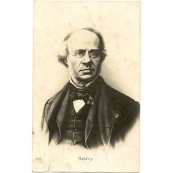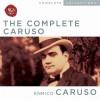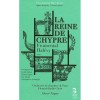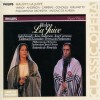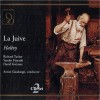| Country: | France |
| Period: | Romantique, Impressionism |
Biography
Jacques-François-Fromental-Élie Halévy, usually known as Fromental Halévy (French: [fʁɔmɑ̃tal alevi]; 27 May 1799 – 17 March 1862), was a French composer. He is known today largely for his opera La Juive.
Halévy was born in Paris, son of the cantor Élie Halfon Halévy, who was the secretary of the Jewish community of Paris and a writer and teacher of Hebrew, and a French Jewish mother. The name Fromental, by which he was generally known, reflects that he was born on the feast-day of that name in the French Revolutionary calendar,[1] which was still operative at that time. He entered the Conservatoire de Paris at the age of nine or ten (accounts differ), in 1809, becoming a pupil and later protégé of Cherubini. After two second-place attempts, he won the Prix de Rome in 1819: his cantata subject was Herminie.
As he had to delay his departure to Rome because of the death of his mother, he was able to accept the first commission that brought him to public attention: a Marche Funèbre et De Profundis en Hébreu for three part choir, tenor and orchestra, which was commissioned by the Consistoire Israélite du Département de la Seine, for a public service in memory of the assassinated duc de Berry, performed on 24 March 1820.[2] Later, his brother Léon recalled that the De Profundis, "infused with religious fervor, created a sensation, and attracted interest to the young laureate of the institute."
Halévy was chorus master at the Théâtre Italien, while he struggled to get an opera performed. Despite the mediocre reception of L'artisan, at the Opéra-Comique in 1827, Halévy moved on to be chorus master at the Opéra. The same year he became professor of harmony and accompaniment at the Conservatoire de Paris, where he was professor of counterpoint and fugue in 1833 and of composition in 1840. His notable students include Georges Bizet, Adolphe Blanc, Adolphe Danhauser, Charles Lebouc, Aimé Maillart, Antoine François Marmontel, Georges Mathias, Jean-Théodore Radoux, and Marie Gabriel Augustin Savard.
With his opera La Juive, in 1835, Halévy attained not only his first major triumph, but gave the world a work that was to be one of the cornerstones of the French repertory for a century, with the role of Eléazar one of the great favorites of tenors such as Enrico Caruso. The opera's most famous aria is Eléazar's "Rachel, quand du Seigneur". Its orchestral ritornello is the one quotation from Halévy that Berlioz included in his Treatise on Instrumentation, for its unusual duet for two cors anglais. It is probable however that this aria was inserted only at the request of the great tenor Adolphe Nourrit, who premiered the role and may have suggested the aria's text. La Juive is one of the grandest of grand operas, with major choruses, a spectacular procession in Act I, and impressive celebrations in Act III. It culminates with the heroine plunging into a vat of boiling water in Act V. Mahler admired it greatly, stating: "I am absolutely overwhelmed by this wonderful, majestic work. I regard it as one of the greatest operas ever created". Other admirers included Wagner, who wrote an enthusiastic review of Halévy's grand operas for the German press in 1841 (Wagner never showed towards Halévy the anti-Jewish animus that was so notorious a feature of his writings on Meyerbeer and Mendelssohn).
Halévy was elected to the Institut de France in 1836, but after La Juive,his real successes were relatively few, although at least three operas, L'éclair, La reine de Chypre and Charles VI received some critical and popular acclaim. Heine commented that Halévy was an artist, but 'without the slightest spark of genius'. He became however a leading bureaucrat of the arts, becoming Secretary of the Académie des Beaux-Arts and presiding over committees to determine the standard pitch of orchestral A, to award prizes for operettas, and so on. The artist Delacroix offers a chilling portrait of Halévy's decline in his diaries (5 February 1855):
I went on to Halévy’s house, where the heat from his stove was suffocating. His wretched wife has crammed his house with bric-a-brac and old furniture, and this new craze will end by driving him to a lunatic asylum. He has changed and looks much older, like a man who is being dragged on against his will. How can he possibly do serious work in this confusion? His new position at the Academy must take up a great deal of his time, and make it more and more difficult for him to find the peace and quiet he needs for his work. Left that inferno as quickly as possible. The breath of the streets seemed positively delicious.[3]
Halévy's cantata Prométhée enchaîné was premiered in 1849 at the Paris Conservatoire, and is generally considered the first mainstream western orchestral composition to use quarter tones.
Halévy died in retirement at Nice in 1862, aged 62, leaving his last opera, Noé, unfinished. It was completed by his former student Georges Bizet, but was not performed until 10 years after Bizet's own death. Bizet married Halévy's daughter Geneviève in 1869. After his death she became a famous salonnière.





